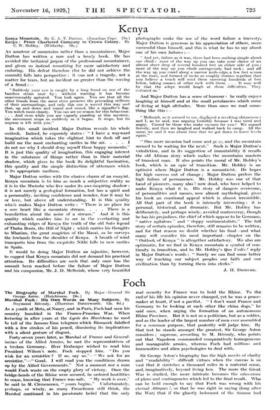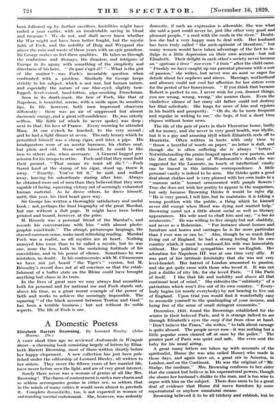Foch
The Biography of Marshal Foch. By Major - General Sir George Aston. (Hutchinson. 24s.) As a youth at Metz, at Nancy, and in Paris, Foch had seen his country humbled in the Franco-Prussian War. When lecturing in after years at the Lye& des Marechaus he used to tell of the famous Ems telegram which Bismarck falsified with a few strokes of his pencil, dismissing its implications
with a silent gesture of disgust.
Forty-seven years later, as Marshal of France and General- issinsg of the Allied Armies, he met the representatives of
a broken Germany: Herr Erzberger wished to read him President Wilson's note. Foch stopped him. " Do you wish for an armistice ? If so, say so."—" We ask for an armistice."—" Good. I will read you the conditions drawn up by the Allied Governments." Not a moment nor a man would Foch waste on the empty glory of victory. Once the bridge-heads of the Rhine were secured, he ordered hostilities
to cease, knowing that. France was safe. " My work is over," he said to M. Clernenceau, yours begins." Unfortunately,
perhaps, or wisely, as -many Frenchmen still think, the Marshal continued in his passionate belief that the only real security for France was to hold the Rhine. To the end of his life his opinion never changed, yet he was a peace- maker at heart, if not a pacifist. " I don't want France and Germany to be looking at each other like china dogs," he said once, when urging the formation of an autonomous Rhine Province. But it is not as a politician, but as a soldier, and as the leader of the largest number of men ever assembled for a common purpose, that posterity will judge him. By that test he stands amongst the greatest, Sir George Aston considers ; supreme, according to M. Recouly, who points out that Napoleon commanded comparatively homogeneous and manageable armies, whereas Foch had millions and immensities and alien psychologies to deal with.
Sir George Aston's biography has the high merits of clarity and "readability "—difficult virtues when the canvas is so vast that it stretches a thousand miles in a material sense, and, imaginatively, beyond living ken. The more the Great War is studied, the more intricate becomes the criss-cross of plans and contingencies which led to the final result. Who can be bold enough to say that Foch was wrong with his eternal Attaquez !, or that he was right in saying (long after the War) that if the ghastly holocaust of the Somme had
been followed up by further sacrifices, hostilities might have ended a year earlier, with an incalculable saving in blood and treasure ? We do not, and shall never know whether the War might not have been better fought, but the mystic faith of Foch, and the nobility of Haig and Weygand rise above the ruin and waste of those years with an epic grandeur. Sir George makes us feel these qualities. He takes us through the confusions and dismays, the disasters and intrigues of
Europe in its agony with something of the simplicity and directness of his hero. " De quoi s'agit-il? "—What is the gist
of the matter ?—was Foch's invariable question when confronted with a problem. Similarly Sir George keeps strictly to his subject, which is not war, but human nature, and especially the nature of one blue-eyed, slightly bow- legged, level-voiced, hard-bitten, pipe-smoking Frenchman.
Seen in its death-mask, the face of Foch, like that of Napoleon, is beautiful, serene, with a smile upon its sensitive lips. In life, however, both men impressed observers differently : there was an air of suppressed but almost daemonic energy, and a great self-confidence. He-Was utterly selfless. His faith (of which he never spoke) was deep ; next to that, his love of France. Every morning he attended Mass. At one o'clock he lunched, to the very second ; and he had a light dinner at seven. The only luxury which he permitted himself was a cheap cigar, and later, a pipe. His headquarters were of an ascetic bareness, his clothes neat, but plain and old. Stern with himself, he could be like iron to others also, when necessary. A General begged per- mission for his troops to retire. Foch said that they must hold their ground. " That means we must all die ? "—Foch stared hard at the stump of his cigar, stood up, threw it away. " Exactly. You've hit it," he said, and walked away, leaving his subordinate staring after him. Always he obtained more out of men than they believed that they were capable of facing, squeezing victory out of seemingly exhausted human material. As he drove others, he drove himself, until, this year, his tired heart gave way.
Sir George has written a thoroughly satisfactory and useful book ; not, perhaps, the final biography of the great Marshal, but one without a dull page. It might have been better printed and bound, however, at the price.
M. Recouly was a personal friend of the Marshal's, and records his conversations with him " with almost photo- graphic exactitude." The abrupt, picturesque language, the • shrewd common-sense, make most refreshing reading. Marshal Foch was a realist, as all mystics are at heart. Nothing annoyed him more than to be called a mystic, but he was one, none the less, both in the sustaining fortitude of his convictions, and in his power of silence. Sometimes he was mistaken, no doubt. In his controversies with M. Clemenceau we have not yet heard " the Tiger's " version, but M. Recouley's record does not at all convince us that the estab- lishment of a buffer state on the Rhine could have brought anything but chaos in its train.
In the lives of great men we may always find moralities both for personal and for national use and Foch stands out, above his time, as a great recent example of the power of faith and works to achieve the seemingly impossible. The squaring " of the black account between Teuton and Gaul " has been a terrible btisiness ; but not without its noble aspects. The life of Foch is one.









































 Previous page
Previous page